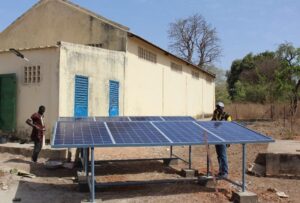
A solar mini grid with the potential to power a range of energy services with adaptation benefits
The ability of energy access to improve incomes, health, and wellbeing, combined with the growing severity of the climate crisis, has increased interest in its potential to enable climate change adaptation.
However, to be truly effective, combined energy access and adaptation interventions must be guided by robust evidence. Currently, more is needed to indicate the extent to which different energy access levels and uses (from ICTs to productive uses) enable adaptation in specific contexts.
In contrast to the link between energy access and climate change mitigation, the link between energy access and adaptation has only recently gained prominence – highlighted by researchers (Perera et al, 2015) and energy access organisations including Practical Action, EEP (2019) and IRENA (2021). Most recently, the Power Up campaign, backed by a coalition of energy and climate organisations (including Practical Action), has called for an increase in both overall adaptation finance as well as the share going to energy access. This is urgently needed to achieve more holistic and effective outcomes for energy deprived and climate vulnerable people and to ensure more efficient use of available finance.
While broad understanding of the nexus between energy access and adaptation has improved, analysis of energy access contributions to adaptation within specific socio-economic and climate contexts remains limited (Perera et al, 2015). Crucially, it should not be assumed that energy access alone will always be sufficient for effective climate change adaptation (Perera et al, 2015; IRENA, 2021). For instance, the extent to which productive energy uses, such as solar water pumping, enable improved incomes, wellbeing and food security also depends on the extent to which energy technologies and the livelihoods they support are environmentally sustainable and resilient to climate hazards (Perera et al, 2015). Indeed, when water demand is not managed, solar pumping for irrigation can deplete water resources, creating or exacerbating food and water scarcity (IRENA, 2021). The distribution of adaptation benefits will also depend on technologies’ affordability and technical complexity as well as gender and other power dynamics present within and between communities (Perera et al, 2015).
Assessments of energy access contributions to adaptation in specific communities are limited (Perera et al, 2015; Hills et al, 2018) and more empirical case studies are needed to inform the design of joint programmes and policies (EEP, 2019; Davide et al, 2019; Perera et al, 2015; IRENA, 2021). This includes analysis of the relationship between adaptation outcomes and specific levels of energy access (as measured by the World Bank’s Multi-Tier Framework), future climate projections, and the role of different contextual factors -social, economic, environmental- in enabling or obstructing adaptation. Without evidence of what works and does not work for different groups and in different contexts, there is a risk that future interventions will miss adaptation co-benefits, or will be ineffective or, worse, maladaptive (raising vulnerability) when trying to achieve them.
To tackle this issue, Practical Action aims to develop a multi-stage research and advocacy programme investigating energy access contributions to adaptation in specific off-grid communities.
Questions we aim to answer include:
- To what extent does energy access translate into greater climate change resilience for different groups and to what extent are outcomes influenced by contextual factors?
- To what extent are energy access outcomes in fact maladaptive to climate change?
- To what extent do ‘tiers’ (levels) of energy access influence levels of resilience?
To answer these questions, we aim to partner with an experienced climate research organisation and to use a robust methodology combining indicators of energy access (such as affordability, reliability, and convenience) and climate change vulnerability (physical exposure and socio-economic sensitivity). By improving the evidence base for this topic and engaging key energy access stakeholders (including communities, off-grid companies, NGOs and local and national governments) in discussions about research findings and implications, we aim to transform the way energy access is delivered in the context of climate change.
If you would like to know more about Practical Action’s research plans or to partner with us in the area of energy access for climate change adaptation, please contact Tom Stevenson or Mattia Vianello at Practical Action:
Tom Stevenson
Tom Stevenson is the Energy and Climate Analyst at Practical Action. He supports our energy change ambition and is also working to integrate energy access and climate change adaptation within our work and the wider sector through research, project development and external influencing.
Mattia Vianello
Mattia Vianello is Head of Energy at Practical Action. As thought leader on energy, Mattia works closely with our offices and international partners to scale up impact across productive uses of energy, humanitarian energy, last mile distribution, clean cooking and the cross-cutting area of energy access for climate change adaptation.
References
Davide M., De Cian, E., and Bernigaud, A., 2019. Building a Framework to Understand the Energy Needs of Adaptation. Sustainability, 2019 (1), pp. 1-32.
Energy and Environment Partnership (EEP), 2019. Energising Resilience. Johannesburg: EEP.
Hills, J.M., Michalena, E., and Chalvatzis, K.J., 2018. Innovative technology in the Pacific: Building resilience for vulnerable communities. Technological Forecasting & Social Change, 2018 (129), pp. 16-26.
Intergovernmental Panel on Climate Change (IPCC), 2022. FAQ 6: What is Climate Resilient Development and how do we pursue it? [Online]. Available at: https://www.ipcc.ch/report/ar6/wg2/about/frequently-asked-questions/keyfaq6/ [Accessed 13.07.22].
International Renewable Energy Agency (IRENA), 2021. Bracing for Climate Impact: Renewables as a Climate Change Adaptation Strategy, Abu Dhabi: IRENA.
Perera, N., Boyd, E., Wilkins, G., and Phillips, R., 2015. Literature Review on Energy Access and Adaptation to Climate Change. London: Department for International Development.